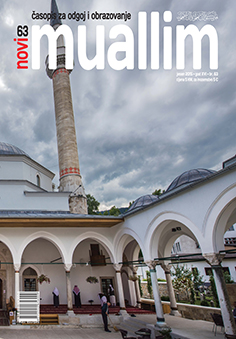DIRECTING ISLAMIC RELIGIOUS STUDIES TOWARDS COMPETITIVENESS
DOI:
https://doi.org/10.26340/muallim.v16i63.109Keywords:
competency orientation, didactics of Islamic religious studies, Islamic religious education, religious didactics, religious instruction, didactics based on the spiral principle (Didaktische Spirale), religious competence, methodological competence, knowledge of subject matter, evaluation skills, spiritual competence, emotional competence, ‘input’/‘output’, orientation, standard of educationAbstract
UDK 37.02:28(430)
Translation: Nina OSMANOVIĆ
This paper examines how Islamic religious education (German: “IRU”) might be taught in a competence-oriented fashion in Germany in the future. A consensus has long existed that all school subjects should be taught in a competence-based method, a concept from which the young and new subject of IRU is not exempt.It iswell-known that a set approach towards teaching Islam is only now first starting to be developed. For this reason, this change of perspective must first be based on and substantiated by the relevant subjectspecific area – in this case IslamicTheology.This article does this by first presenting and explaining the interdisciplinary competences and then by elucidating on Islamic religious understanding by examining the twin Islamic concepts of knowledge and action.These two spheres are brought together and the question regarding the extent to which both elements are compatible with each other and can be employed in IRU is discussed.The text concludes by evaluating the issue under consideration and provides suggestions as to how the understanding of competencies might be expanded and adapted to IRU.
Downloads
Published
How to Cite
Issue
Section
License
Naknada:
a. Časopis ne naplaćuje naknadu za obradu članaka (APC) i naknadu za podnošenje članaka.
Autori koji objavljuju u ovom časopisu pristaju na sljedeće uvijete:
- Autori zadržavaju autorska prava i pružaju časopisu pravo prvog objavljivanja, pri čemu će rad jednu godinu po objavljivanju biti podložan licenci Creative Commons imenovanje koja omogućuje drugima da dijele rad uz uvijet navođenja autorstva i izvornog objavljivanja u ovom časopisu.
- Autori mogu izraditi zasebne, ugovorne aranžmane za ne-ekskluzivnu distribuciju rada objavljenog u časopisu (npr. postavljanje u institucionalni repozitorij ili objavljivanje u knjizi), uz navođenje da je rad izvorno objavljen u ovom časopisu.


